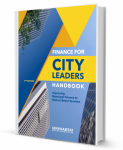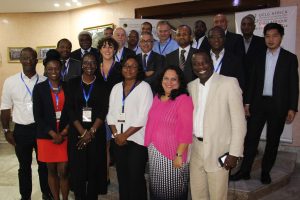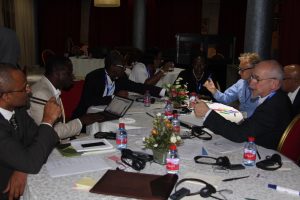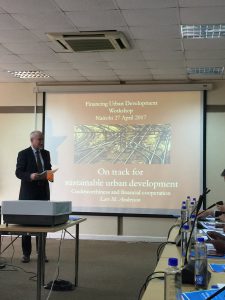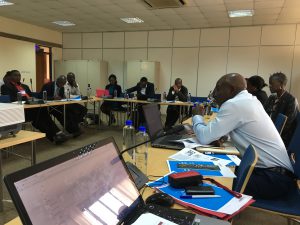The following is a paper that I wrote for the Financing Urban Development Workshop in Nairobi 27 April 2017. The workshop was organized by UN-Habitat.
On track for sustainable urban development –
Creditworthiness and financial cooperation
Lars M Andersson
Urbanisation and a growing need for local infrastructure investments
The urban population has outnumbered the rural since 2007. By 2050, the share of city dwellers is expected to reach 66 percent, but the situation is different in different parts of the world. While Europe and the Americas had an early urbanisation, the process is today rapid in Africa and Asia. According to the World Urbanization Prospects (UN 2014) ”Africa and Asia…are projected to become 56 and 64 per cent urban, respectively, by 2050”.
The rapid urbanisation leads to a growing divide between cities and rural areas, with great challenges for both:
- a rapidly increased need for public services and infrastructure investment in big cities. The infrastructure is essential in order for society to function. There is often an urgent need to upgrade systems for transportation of goods and people (commuters). New education facilities are needed, and so on. This produces a pressure to increase investment plans and the necessity to have access to financing.
- the necessity to provide local services in rural local authorities with less income (from taxes or fees). To be able to, for example, provide for the elderly who do not move to cities in the same extent as young people. Furthermore, they have the challenge of keeping the workforce for the production of the needed public services.
The possibilities to produce local public services and to meet future challenges are determined by the local authority’s access to finance. It is a fact that local authorities’ powers to impose taxes, rates, charges and/or fees are in many cases limited in both developed and developing countries. This is in spite of the frequently present rhetoric of decentralisation. Real decentralisation does not happen if the control of local finance is in the hand of the central government. A change is required if cities and other local authorities are to successfully meet future challenges.
Decentralisation of power (sometimes referred to as devolution) within the public sector has for some time been the pronounced trend. There are several arguments for decentralisation and the most important are
- Efficiency in delivering public services; local authorities are best placed to handle the allocation of public resources locally, simply because they have the knowledge of local needs and local challenges.
- Democratic accountability; local politicians having the real power of local public services are also subject to direct accountability from the side of the citizens. The accountability of national politicians is often diluted because of the distance to the people in general.
- Improve citizen participation in matters concerning the society; decentralisation is a way of bringing important political decisions that governs our daily life “closer to the people”.
- Facilitates efficient and humane integration through greater flexibility and proximity to civil society.
A decentralisation process addresses almost all the questions that are vital for well functioning local authorities, i.e.:
- Relationship between local authorities and central government, both legally and financially.
- Flow of income; stability, predictability, diversification, trends (especially of tax-bases), system for collection, collection rates and the possibilities to tap new local taxes.
- Cost-structure; steering and control
- Debt; size, interest payments, maturities, payment record and central government restrictions.
- Institutional factors; organisation, accounting system, audit, level of knowledge and skills.
The local authorities themselves have to, on one hand, show that they are prepared to assume new powers and, on the other hand, in concerted action push central authorities to realise long needed power reforms.
Creditworthiness is about more than borrowing
What is said above about the questions that decentralisation revolve around are, of course, also crucial when it comes to the question of creditworthiness. Basically, creditworthiness is about having the local authority’s “affairs” in order, which is, to say the least, desirable even when you don’t intend to borrow money from anyone. For this reason creditworthiness could in certain circumstances be renamed to “operational worthiness”. But, what is creditworthiness more precisely? The narrow definition is that the entity in question should be able to repay its debt in time and in full, which is not an unreasonable demand. The road to achieve this runs through sound financial management, including fully functional routines for budgeting, accounting, reporting and auditing. There has also to be a possibility to predict future income, not only from own-source revenues, but also from central government transfers.
Municipal cooperation
One area where municipal cooperation has been around for a long time is financial cooperation in order to achieve better conditions for local infrastructure investments. Even though this has a long tradition, over 150 years, the trend is revived in the last 30 years with many new projects recently seeing the light of day. This type of cooperation is often called Pooled Financing Mechanisms (PFM).
PFMs do not remove the decision-making power of the individual local authority, and should be viewed as a complement to other funding sources. Large local governments like capital cities and their close peers can continue to benefit from direct access to bank financing and bond markets, choosing the most efficient source at a particular point in time. However, for most medium-sized and small local governments, municipal pooled financing may be the only mechanism that provides access to long-term and adequately priced debt financing.
PFMs have mainly been applied in the developed world; in the last 10–15 years, there have been few PFM experiments in developing countries. However, there is nothing preventing PFM from becoming a much more common strategy around the world if the trend towards decentralization in developing countries continues—PFMs are a by-product of fiscal decentralization and the growing importance of local governments. Moreover, PFMs can be proactively initiated and implemented by policy makers in developing countries to deepen fiscal decentralization and increase its benefits. Thus, PFMs can play a crucial role in financing growing local infrastructure needs by giving local governments access to capital markets and by providing institutional investors with a new, attractive and reliable asset class. PFMs also foster participating local governments’ financial management capacity, accountability, and creditworthiness, making them stronger and more capable institutions. Financing infrastructure and building independent capacities in local authorities are particularly crucial concerns in the OECD economies, but even more so in places that are less economically developed.
LGFAs have a long and successful history in Northern Europe. The oldest is the Danish agency Kommunekredit created in 1898. The newest additions in the list below are the French Agence France Locale and the UK Municipal Bond Agency, created during the last few years.
LGFA Country Year of creation
Kommunekredit Denmark 1898
Bank Nederlandse Gemeenten (BNG) Netherlands 1914
Kommunalbanken Norway 1926
Nederlandse Waterschapsbank (NWB) Netherlands 1954
Kommuninvest Sweden 1986
Munifin Finland 1990
JFM Japan 2008
New Zealand LGFA New Zealand 2011
Agence France Locale France 2013
UK Municipal Bond Agency UK 2014
U.S. municipal bond banks have a slightly different set-up. They are usually closely related to various state governments. The oldest municipal bond banks are in the New England states, but the concept has also spread to other parts of the country. In Canada, there are provincial entities for financing local authorities in a number of provinces, including British Columbia and Alberta.
The state-owned Japan Finance Corporation for Municipal Enterprises was converted into Japan Finance Organization for Municipalities (JFM), and in 2008 Japanese local governments became its owners.
The New Zealand LGFA was created in 2011 and, recently, the Australian state of Victoria formed its Local Government Funding Vehicle.
Also in emerging and developing countries, municipal pooled financing has been developed with the help of international development institutions. Two examples are the Indian Tamil Nadu Urban Infrastructure Financial Services Limited (TNUIFSL) and bond banks in Mexico. TNUIFSL is a public–private partnership with a wider scope of activities than, for example, the European LGFAs, since members of its staff also act as consultants and investment advisors. Mexican bond bank–type entities exist in the states of Hidalgo and Quintana Roo.
Working together – key questions
In my work with financial cooperation between local authorities, I have found that the following value base is crucial:
- Equality; all local authorities should be treated equal. All exceptions (for example: different margins) should be logical and
- Transparency; the Agency should be as open as possible with information to the local authorities, and to the financial markets, about the Agency’s activities.
- Involvement; the local authorities should be made to feel that this is their project, for which every local authority has a responsibility.
This value base can be compared with what the Nobel Prize Laureate Elinor Ostrom concluded to characterize successful so-called commons. She found that the following was decisive:
- Define clear group boundaries.
- Match rules governing use of common goods to local needs and conditions.
- Ensure that those affected by the rules can participate in modifying the rules.
- Make sure the rule-making rights of community members are respected by outside authorities.
- Develop a system, carried out by community members, for monitoring members’ behaviour.
- Use graduated sanctions for rule violators.
- Provide accessible, low-cost means for dispute resolution.
- Build responsibility for governing the common resource in nested tiers from the lowest level up to the entire interconnected system.
In many cases of cooperation between public sector entities, it is recommended that political decisions be separated from the professional. In the case of a PFM agency, as described above, the political level should be dealing with questions related to overall strategy; questions related to the participating local authorities (capital, guarantees, supervision etc.); and with the follow-up of the professional level. The duties of the professional level, on the other hand, are to prepare the questions for the political level and to handle all financial activities. This not only secures low-risk activities, but also prevents undue influences in the lending activities.
Finally, successful cooperation is always build trust and transparency.

